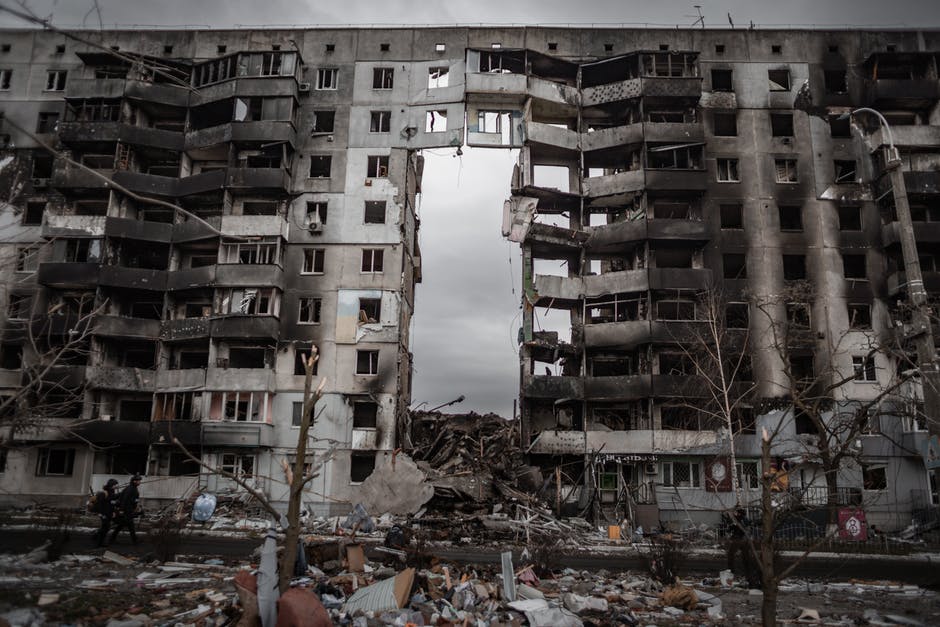World War III has begun because Russia is at war with the US.
Russia's invasion of Ukraine has created the most significant foreign policy crisis for the United States since World War II. President Biden has handled the situation with skill and expertise, especially in uniting NATO. The policy he is pursuing is a careful balancing act of doing much to support Ukraine while not drawing NATO into direct fighting, which could escalate into World War III.
However, laudable the aims of seeking non-military solutions and avoiding escalation of the violence, this approach is misguided. It presumes we can prevent a war (World War III) that has already begun. Whether we want to admit it or not, and although it has not been officially declared, World War III has begun: because Russia is at war with the United States. Most importantly, we need to start acting as if World War III has started!
Why do I say that World War III has already begun? First, Russia's attack on Ukraine is not simply against Ukraine but against the world order. Ukraine has been an independent country since the dissolution of the Soviet Union. In a popular vote in 1991, the Ukrainian people supported independence, where 92% voted for independence. Neither Russia nor any other country has the right to invade the sovereignty of an independent country that poses no threat to itself. Such an attack is an attack on every independent nation in the world. It is an attack upon us, and it cannot be allowed to stand.
Second, by its invasion, Russia has continued to violate its specific commitments to respect Ukraine's independence and sovereignty. The Biden administration has drawn a clear line that the US is obligated to and will defend every inch of NATO territory but claims we do not have a similar obligation to Ukraine since it is not a NATO country. Regrettably, such a focus on Ukraine's non-NATO status, ignores the commitments the US and Great Britain made to Ukraine in 1994.
At the dissolution of the Soviet Union, a large nuclear force was located within Ukraine. With much pressure from the United States and Russia, Ukraine agreed to give up its nuclear weapons and capabilities and become a non-nuclear state. In return, Russia, Great Britain, and the United States provided Ukraine with security assurances codified in the Budapest Memorandum signed on December 5, 1994.
Russia's invasion of Crimea in 2014 and of Ukraine this year violates one of the assurances made: Ukraine's independence, sovereignty, and existing borders would be respected. Since Russia has violated this, both the United States and Great Britain have a moral obligation to assure and thus defend Ukraine's independence, sovereignty, and 2014 borders.
Third, recent public statements indicate Putin and Russia are acting as if they are at war with those assisting Ukraine. True, there has been no military engagement between Russian and NATO forces. But, Putin himself claims and acts as if we are at war. On March 5, 2022, Putin stated that he considers the sanctions on Russia "akin to a declaration of war." On April 15, 2022, Russia, through diplomatic channels, warned the US that continued military assistance to Ukraine could have "unpredictable consequences." If we are to take Putin at his word—and in this case, I see no reason we should not--then from Putin's and thus Russia's perspectives, most of the world is already at war with Russia.
World War III has begun and national leaders must begin acting like it. Our policies, statements, actions, and strategies must switch from trying to "avoid" World War III to answering the question: What strategy will lead to the best outcome for World War III?
There is genuine danger in every step we take and in every step we do not take.
Writ large, the best outcome is twofold: first, we repel Russia's military operations in Ukraine and and second obtain international recognition for Ukraine's independence, sovereignty, and 1994 borders. This requires us to provide Ukraine with more advanced weapons and consider if and when to provide direct military assistance. Yes, such steps are fraught with danger. But given that Russia is at war with us, there is genuine danger in every step we take and in every step we do not take.
Danger in Every Step
What makes policy calculations so difficult is that we cannot and do not know the mind of Vladimir Putin. Consequently, to answer the question "What strategy will lead to the best outcome for this war?" we need to consider a number of things.
First, we must consider what Putin will do if it becomes clear that he is losing the war. To some degree, we already know the answer to this question. His original plan was to take over the entire country of Ukraine, including the capital city of Kyiv, and then set up a puppet government sympathetic to Russian' (and by that, I mean Putin's) positions. Russia has failed at that strategy.
As it became clear that Putin was losing the war (i.e., not meeting the original goals), Putin began a new strategy to invade Ukraine solely from the east/southeast into Ukrainian areas in which Russian speakers are the majority. Russia has been attacking these areas since the beginning of the war. In addition, since 2014, Russia has occupied and annexed Crimea away from Ukraine. In addition, Russian-backed Ukrainian separatists have occupied sections of the Donbas and Luhansk provinces of Ukraine, and fighting in those areas has been constant since 2014.
Let's assume that this strategy is also ineffective, and Russian forces are essentially pushed back into Russia. This scenario may be the most unpredictable because we do not know what extremes Putin might do if it unfolds. He could use chemical, biological, or even small nuclear weapons in Ukraine to try to scratch out some sort of victory.
The war crimes that Russia has already committed in Ukraine (and previously committed in Syria and Chechnya) reveal that Putin is willing to go to extremes. Nevertheless, it seems unlikely that a weakened Putin who could not defeat Ukraine would choose a direct fight with NATO regardless of what aid NATO has provided to Ukraine.
Of course, an irrational Putin could do almost anything, including starting a nuclear war with the West. Unfortunately, there is not much we can do about this scenario other than to clarify that such moves would mean an end to him and Russia. Tragically, it would also mean an end to the entire world as we know it. As long as nuclear weapons curse our world, there is nothing we can do to prevent an irrational leader with nuclear weapons from using them. Nevertheless, our actions in Ukraine do not change this reality one way or the other. Therefore, it is not relevant when determining our strategy in Ukraine. We must presume that either Putin is not so irrational or that if he were to become so irrational that there would be sufficient internal controls on Russia's nuclear weapons, including that those in Russian command and control would be unwilling to follow such insane orders.
I have spent most of my life arguing that nuclear deterrence is an inherently unstable strategy for dealing with nuclear weapons. The only actual protection is complete and verifiable nuclear disarmament. Unfortunately, while the world has reduced the number of nuclear weapons since the height of the Cold War, it has never moved away from the doctrine of nuclear deterrence. We can only hope that the doctrine continues to prevent nuclear war. Moreover, my point is that none of this situation changes, no matter the support provided to Ukraine. It is always the case that any irrational leader in possession of nuclear weapons could take such a terrible step.
Second, we must consider what Putin will do if he is successful in Ukraine. Since his first military strategy has failed, this second possible scenario is that Russia captures sections of territory in the eastern and southern parts of Ukraine. We have every reason to believe that if that were to happen, Russia would at some time use these "liberated" territories to capture even more territory. This approach is a much slower process than Putin initially tried, but it could be even more effective in achieving Putin's goals.
It will be challenging to stop Putin if this slow expansion process works. Likely Moldova would be next. It lies south of Ukraine and is not a NATO member nation. Moreover, like Ukraine, it has a small area controlled by Russian-backed separatists. So, Moldova would face the same situation that Ukraine now faces.
Next would be the Baltic States of Lithuania, Latvia, and Estonia. There is a strange geographic anomaly in this area – a piece of Russia exists just south of Lithuania, and it is not connected to the rest of Russia. No doubt Putin would at the very least want a land bridge to reconnect that piece of Russia to the motherland. The Baltic states were once part of the Soviet Union, so Putin's "logic" would apply to these nations as it did to Ukraine. The complication is that these three nations are part of NATO. But if we let Putin get that far, he would likely conclude that the US (for instance) will not send our sons and daughters to fight for these small nations even if they are part of NATO. What would be next? Poland?
Biggest Danger is a Putin Success
The most dangerous thing we can do is to let Vladimir Putin succeed. If he does succeed, there is no reason to believe he will stop. Moreover, his success will be an example to other authoritarian leaders on achieving their goals. They are never satisfied. History provides powerful examples that appeasement only leads to more death and destruction. In hopes of avoiding World War II, Hitler was allowed to annex the German-speaking parts of Czechoslovakia. A year later, Hitler's Germany invaded Poland.
As frightening as it may be, we cannot allow a nuclear threat to stop assistance to Ukraine. It is doubtful that Putin would use strategic nuclear weapons against the West, but it is conceivable, though still unlikely, that he would use a tactical nuclear weapon against Ukraine. However, suppose Putin is allowed to win because we feared he might use nuclear weapons. Doing so would demonstrate to other authoritarians that threatening the use of nuclear weapons is an effective way to obtain their objectives. China could take Taiwan with a nuclear threat. North Korea could take South Korea with a nuclear threat. What might their next step be if they achieve these goals? What about others who have nuclear weapons?
Because the US, the West, and the world have so much to lose if Russia wins, we should do everything to help Ukraine win. If not, it will be American troops on the front lines before we know it, perhaps when Russia goes on to try to take a NATO country. While the dollar amount that we have already given in aid to Ukraine may sound significant, it is not in the face of war. We were especially weak before and at the beginning of the war. Despite our intelligence on what Russia was up to before the war was spot-on, our intelligence assessment of Ukraine's ability to compete in the war was terrible.
Because the US, the West, and the world have so much to lose if Russia wins, we should do everything to help Ukraine win.
These assessments indicated that Ukraine might only last a few days. Consequently, we did not want to provide large numbers of weapons to a losing cause, especially if those weapons would fall into Russian hands. Since then, we have seriously upped our game in terms of quantity and nature. However, it is not enough!
Artillery, bombs, and missiles are destroying Ukraine from the sky. To win the war, Ukraine needs more advanced weapons to counter this and engage Russian forces. We should be providing fighter airplanes and Patriot missile defense systems, and perhaps other weapons. Putin will not like this, but he is unlikely to do anything to bring NATO directly into the fight. Moreover, the threat of Putin defeating Ukraine is more significant. We can keep World War III limited to its present dimensions, or the fighting will become worldwide in scope.
Afterword On Nonviolence
The above argument might not be surprising coming from a hawk, but I am a dove. As a long-time advocate of nonviolence, an anti-war activist, and a social ethicist with specialties in international ethics and the ethics of nuclear weapons, I am surprised by the position I take in the above post. With such a history and background, I typically warn against military solutions and urge nonviolent steps such as diplomacy and negotiation.
However, by making this argument, I have not abandoned my commitment to nonviolence and peacemaking. There are nonviolent things that can be done in times of war. A parallel historical example is Danish resistance disguised as collaboration during World War II. The Danes knew they could not stop a German invasion, so they let the occupation occur. However, Danish leaders frustrated Nazi goals by negotiating, delaying, and obstructing. At the same time, a resistance underground countered Nazi objectives by conducting sabotage, labor strikes, and rescuing almost all Danish Jews.
Indeed, some nonviolent steps contributed to the failure of Putin to capture the capital of Kyiv by invading from the north via Belarus. For the logistical support of the invasion, Russia planned to rely on the train system in Belarus. However, anti-war activists in Belarus sabotaged train lines while internet hackers disrupted the train's command and control systems. In addition, Ukrainian citizens messed with the road signs in northern Ukraine, doing simple things like changing the arrows that pointed the way to Kyiv.
At the beginning of a war, those who reject nonviolence often ask, "Now, what could nonviolence do?" As the above reveals, more than most think! But more importantly, the time of war is not when nonviolence is most effective. Nonviolent strategies could and should have been applied in the past, making the war in Ukraine less likely. Most of these have to do with not letting Putin become so powerful. Western Europe should never have become so dependent on Russian oil and gas. They could have done so by using other sources and moving much more quickly to green energy. The West should have punished Putin much more severely for previous wrong actions instead of merely slapping him on the proverbial wrist. The world could have done much more in terms of nuclear disarmament. The West should not have let Russian oligarchs, with their ill-gotten gains, hide and invest such money in the West. Western companies should not have invested so much money in Russia. These are just a few examples of the nonviolent steps that could have been used, and they would have decreased the likelihood that we would currently be in this situation.






